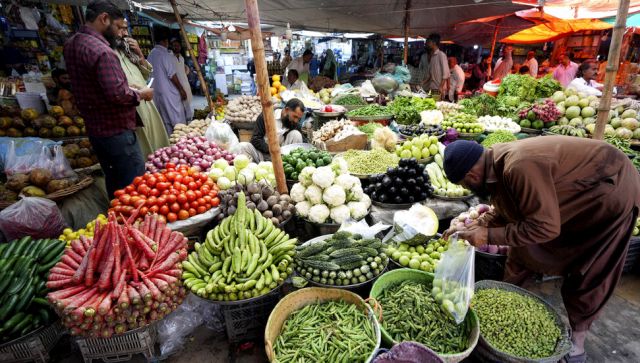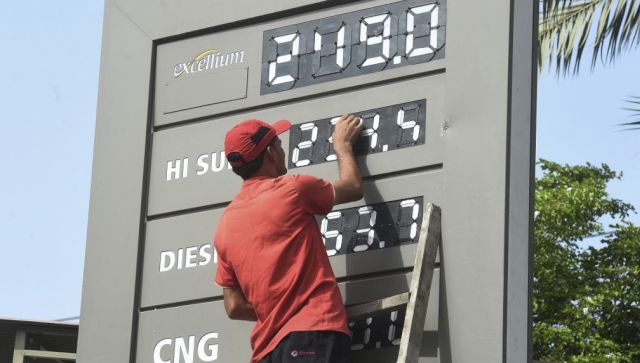Staring at bankruptcy, Pakistan is desperate for the International Monetary Fund (IMF) bailout. As the government grapples to meet “tough” IMF conditions, the country has little choice but to usher in changes – increase taxes and do away with subsidies on essential commodities. On Wednesday, Finance Minister Ishaq Dar introduced the Finance (Supplementary) Bill 2023 in the nation’s National Assembly, a “mini-budget” that aims to generate Rs 170 billion (in Pakistani currency) in four months to
secure the bailout . But how will the country raise that whopping amount? And what does this mean for the common man? The increase in GST Prices are already surging in Pakistan; almost all essentials have become unaffordable. Amid this, the financial bill has proposed increasing General Sales Tax (GST) from 17 per cent to 18 per cent. On luxury items, GST has gone up from 17 per cent to 25 per cent. The increase in GST means that items like ghee will become more expensive and cooking prices will increase. Also read: Pakistan’s crisis is only going to worsen: What happens if the country defaults Pakistan Vanaspati Manufacturers Association General Secretary Umer Islam Khan estimated a jump of PKR 3 to PRK 5 per kg/litre in ghee, according to a report in the Dawn newspaper. Before the latest hike, B-grade ghee and cooking oil were sold for Rs 500 for 900 grammes. The better quality cooking oil and ghee cost Rs 3000 for a tin of five kilos. Import of edible oils has been hit as
Pakistan’s forex reserves have dwindled. “If this situation persists the industry would be unable to meet the demand for ghee/cooking oil in Ramazan (which starts next month),” he told Dawn. [caption id=“attachment_12163012” align=“alignnone” width=“640”] Graphic: Pranay Bhardwaj[/caption] Fuel hike On Wednesday night, Pakistan further hiked the
prices of petrol and gas to a historic high. The
petrol price has been increased to 272 rupees per litre after an increase of 22.20 rupees, a press release from the Finance Division read, noting that the surge has taken place due to the rupee’s devaluation against the dollar. The price of high-speed diesel has been increased to 280 rupees per litre after a hike of 17.20 rupees. Kerosene oil will now be available at 202.73 rupees per litre following a 12.90 rupees hike. Meanwhile, light diesel oil will be available at 196.68 rupees per litre after an increase of 9.68 rupees, reports ANI. The increase in the price of petroleum products was one of the preconditions of the Washington-based lender, which will lead to a hike in the already record-high inflation, coupled with the new fiscal measures undertaken through the “mini-budget”. Also read: Pakistan crisis: Can the country be saved from collapse? Cigarettes, aerated drinks Pakistan has proposed an increase in the federal excise duty on cigarettes and aerated drinks. A spokesperson of tobacco company Philip Morris Pakistan said the proposed tax hike if implemented would enhance the price of cigarettes by around 250 per cent, reports Dawn. [caption id=“attachment_12163022” align=“alignnone” width=“640”]
Cigarettes will become more expensive in Pakistan. A stick from a regular brand costs Rs 5.05. AFP[/caption] The federal excise duty (FED) on expensive brands has gone from Rs 6.5 per cigarette to Rs 16.5. For less expensive brands the per stick increase is from Rs 2.55 to Rs 5.05, an increase of 98 per cent, according to The Express Tribune. The finance minister said that the Cabinet has also approved the increase in the FED on sugary drinks and beverages to 20 per cent, up from 13 per cent. But this measure will take effect only after the approval of the Finance Bill by the National Assembly, he added. The FED on juices has been proposed to be set at 10 per cent in the first phase. Air travel, mobile phones The federal excise duty on air travel for first-class and business-class tickets has been increased by 20 per cent of the airfare or Rs 50,000, whichever is higher. Sales tax on mobile phones with a value exceeding USD 500 will be set at 25 per cent against 17 per cent earlier. Until last week, the Apple iPhone 14 was priced at Rs 3,17,600 in Pakistan. For comparison, in India, it cost Rs 79,900 at the time of launch. (One Indian rupee is currently equivalent to Rs 3.21 Pakistan rupee today.) With the price increase, the phone is expected to cost Rs 3,97,000 in the neighbouring nation. [caption id=“attachment_12163052” align=“alignnone” width=“640”]
 In Pakistan, inflation is expected to soar even more in the coming months. The inflation rate of 26 per cent could rise to 40 per cent following the imposition of new taxes. AP[/caption] Bike prices Amid new taxation measures, automakers in Pakistan raised prices. Atlas Honda Ltd (AHL), the assembler of Honda bikes, increased the prices between Rs 9,000 to Rs 35,000 on Wednesday. The Pakistan government will now collect anywhere between Rs 21,035 to Rs 64,510 on different engine capacity bikes as compared to the previous rate of Rs 18,729 and Rs 56,361, reports Dawn. Chicken, milk, eggs
Essential items like wheat, flour, rice, egg, milk, chicken and vegetables are exempted from the hike. But with high inflation, they are unaffordable to many. On 13 February, broiler chicken cost Rs 480 to Rs 500 per kg and milk packet cost Rs 210 per litre, reports Dawn. Milk cost Rs 190 earlier. According to the report, chicken was sold for Rs 390 to Rs 440 per kg until last week, and Rs 380 to Rs 420 per kg in the last week of January. [caption id=“attachment_12163082” align=“alignnone” width=“640”]
In Pakistan, inflation is expected to soar even more in the coming months. The inflation rate of 26 per cent could rise to 40 per cent following the imposition of new taxes. AP[/caption] Bike prices Amid new taxation measures, automakers in Pakistan raised prices. Atlas Honda Ltd (AHL), the assembler of Honda bikes, increased the prices between Rs 9,000 to Rs 35,000 on Wednesday. The Pakistan government will now collect anywhere between Rs 21,035 to Rs 64,510 on different engine capacity bikes as compared to the previous rate of Rs 18,729 and Rs 56,361, reports Dawn. Chicken, milk, eggs
Essential items like wheat, flour, rice, egg, milk, chicken and vegetables are exempted from the hike. But with high inflation, they are unaffordable to many. On 13 February, broiler chicken cost Rs 480 to Rs 500 per kg and milk packet cost Rs 210 per litre, reports Dawn. Milk cost Rs 190 earlier. According to the report, chicken was sold for Rs 390 to Rs 440 per kg until last week, and Rs 380 to Rs 420 per kg in the last week of January. [caption id=“attachment_12163082” align=“alignnone” width=“640”] Even everyday items like eggs and chicken have become unaffordable. AFP[/caption] The fallout: Inflation to soar “The imposition of more taxes means tough times ahead for the majority of Pakistanis, who are already facing higher food and energy costs, but there is no other way out if Pakistan needs IMF loans and Pakistan desperately needs them,” Ehtisham-ul-Haq, a veteran economist, said. Pakistan’s inflation rate of 26 per cent will rise to 40 per cent following the imposition of new taxes. However, in an interview, he stated that “life will become more difficult for the common man if Pakistan fails to restart the IMF bailout without further delay”. According to Katrina Ell, a senior economist at Moody’s Analytics, inflation in the first half of 2023 could average 33 per cent. “Our view is that
an IMF bailout alone isn't going to be enough to get the economy back on track. What the economy really needs is persistent and sound economic management,” she told Reuters. “There’s still an inevitably tough journey ahead. We’re expecting fiscal and monetary austerity to continue well into 2024,” she added. With inputs from agencies Read all the Latest News , Trending News ,
Cricket News , Bollywood News , India News and Entertainment News here. Follow us on
Facebook,
Twitter and
Instagram.
To please the IMF, Pakistan has unleashed misery on its people already grappling with inflation. With an increase in GST, the cost of ghee, cold drinks, and cigarettes will rise. Fuel prices have hit a historic high with petrol costing Rs 272 per litre
Advertisement
End of Article


)

)
)
)
)
)
)
)
)



